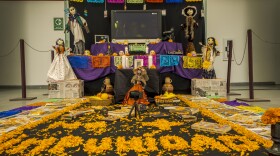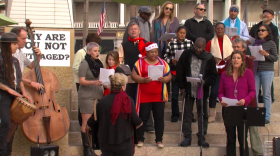
Matthew Bowler
Video JournalistMatthew Bowler is an award-winning journalist from San Diego. Bowler comes from a long line of San Diego journalists. Both his father and grandfather worked as journalists covering San Diego. He is also a third generation San Diego State University graduate, where he studied art with a specialty in painting and printmaking. Bowler moved to the South of France after graduating from SDSU. While there he participated in many art exhibitions. The newspaper “La Marseillaise” called his work “les oeuvres impossible” or “the impossible works.” After his year in Provence, Bowler returned to San Diego and began to work as a freelance photographer for newspapers and magazines. Some years later, he discovered his passion for reporting the news, for getting at the truth, for impacting lives. Bowler is privileged to have received many San Diego Press Club Awards along with two Emmy's.
-
Through Noche de Poetas, local writers create a safe space to share their work and honor Tijuana's poetic tradition with a forthcoming anthology.
-
An altar in Tijuana honoring journalists killed in Mexico features broken cameras, a bullet-ridden laptop and a typewriter.
-
Libros, Café y Jazz marks 15 years as Tijuana's go-to bookstore, offering used books, coffee and jazz performances for all ages.
-
Since 1994, the Sherman Heights community has honored the departed through Day of the Dead celebrations, blending tradition with remembrance.
-
KPBS Video Journalist Matthew Bowler gives us a look inside this special celebration of life after death.
-
The event brings 63 artists from across Mexico for 10 days of performances across the city.
-
Vacant lots and blighted spaces can increase crime rates and lower property values. In City Heights, local groups are transforming them into vibrant community hubs.
-
Some homeless members of the Voices of Our City Choir were given citations by police last week for sleeping in their tents on city sidewalks, but they say they had nowhere else to go.
-
When a U.S. company brings an immigrant worker into the country on an H-1B visa, it pays the federal government a fee to help train American workers to one day fill the job. Now that money is flowing into San Diego County.
- Experts concerned about white nationalist imagery in ICE recruitment materials
- New Terminal 1 at San Diego Airport opens to passengers
- Ramona cemetery district board member uncovers unusual compensation records
- Trump blames Tylenol for autism. Science doesn't back him up
- Animal shelter supervisor ‘out of the office’ after revelation of profane recording













